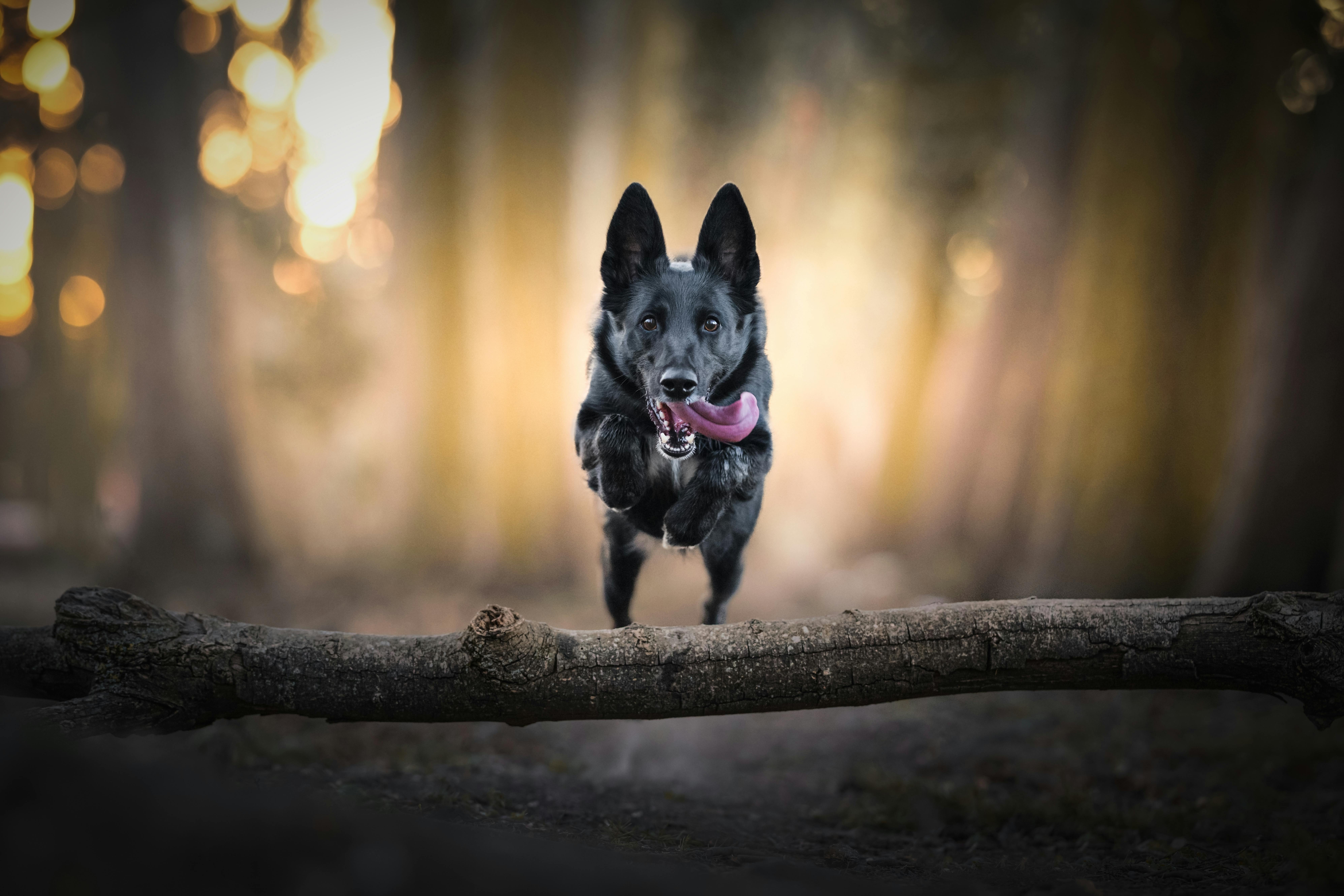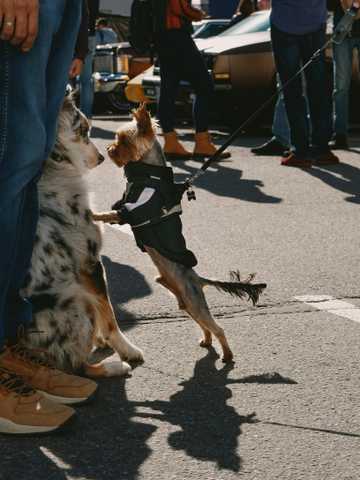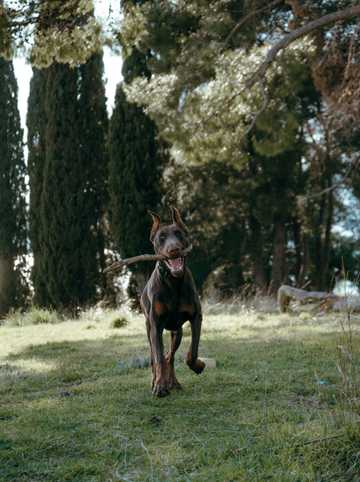Why Dogs Run Away and How to Keep Them Safe

Even the most loyal dogs may unexpectedly wander off due to instinctual drives, fear responses, or just sheer boredom. But don’t worry! In this article, we’ll delve into the common reasons behind this escaping behavior and offer practical solutions to deal with it and keep your dog safe.
Why Dogs Wander Off: Most Common Reasons
Chasing or Hunting Instincts
Some dogs are natural hunters, so controlling their instincts is challenging. Regardless of whether they’re walking with you or if there is a possibility of them dashing out of the yard when they spot a bird or squirrel, they will most likely do it.
Breeds that are likely to wander off:
-
Beagles
-
Huskies
-
Jack Russell Terriers
-
Chihuahuas
-
Dachshunds
-
Yorkshire Terriers
-
Bloodhounds
Other breeds, on the contrary, have less inclination to run away. Many believe that herding, tracking, and mellow dog breeds are less likely to escape since they have a strong sense of loyalty and prefer to stay near their owner. Not to mention, some of them often live in wild yard spaces, so they have a chance to roam freely anyway.

Breeds that display less desire to run away are:
-
Pugs
-
Labrador Retrievers and Golden Retrievers
-
German Shepherds (when appropriately trained)
-
Border Collies
-
Spaniels

Mating Instincts
Why do dogs escape even when they belong to companion breeds? For some of them, it all comes down to a mating instinct. Dogs typically reach sexual maturity at around 6 months old, and during this time, hormonal changes can lead to unexpected behaviors, such as running off to find an opposite-sex dog.
This behavior is more common in male dogs. You have two options: neutering, which can lower testosterone levels within about 6 weeks and return behavior to normal*, or supervising your dog more. The choice is yours.
*Neutering is advisable only if your puppy is escaping to seek female dog in heat. However, neutering your dog before they’re fully grown is not recommended.
Dog's Fear
Even though dogs are brilliant animals, they still may get scared of things we wouldn’t particularly worry about. A random loud noises, fireworks, a big crowd – these and more can startle your dog, causing them to run off.
The best approach here is to understand what might scare your dog and either avoid it or gradually acclimate your pooch using desensitization and counterconditioning methods.

Separation anxiety
Dogs that suffer from separation anxiety have a phobia of being away from their owner and being home alone. The reasons might differ; usually, it’s because the dog isn’t used to staying home alone from a young age or as a result of a traumatic experience.
Usually, if your dog has separation anxiety, there are accompanying symptoms like vocalization (barking, whining, howling), scratching at the door, urination/defecation, and destructive behavior when home alone.
High Energy That Isn’t Channeled Properly
Some dogs have higher energy needs than others (e.g., Border Collie, Jack Russell, Weimaraner). If these needs aren’t met, these pups will start to look for adventure. To prevent escapes, do enough training and spend quality time with your pet, depending on their energy level.
Try different activities besides walking, like cycling, running, agility training, or swimming. Additionally, keep your dog’s mind busy, providing them with opportunities for mental stimulation.
If you struggle to develop such ideas, download the Woofz app, which offers engaging exercises to prevent boredom and strengthen your bond.
What to Do if Your Dog Runs Away from You When Walking
The first rule is never to let your dog off-leash if you’re unsure you have complete vocal control over them. But if you do so for some reason and they escape, don’t chase them; this will only cause them to run away faster.
Helping tips in case your dog escapes:
-
Run in the opposite direction (your movement will draw your dog’s attention, making them think you're playing a game).
-
Make funny and encouraging noises instead of simply calling their name.
-
If none of the above is working, just sit and wait.
-
Consistently reinforce with lots of treats and praise when they come back. Put them on the leash, but let them sniff and walk a bit before going home so they don't associate coming back with the end of their fun.
How to Stop My Dog from Running Off

Satisfy Your Dog's Needs
Provide appropriate walks, playtime, and training according to their energy levels, ensuring they can sniff, run, and play with other dogs.
Combat boredom and anxiety if they spend a lot of time alone by entertaining treat dispensers, puzzle games, chew toys, and DIY mental stimulation toys.
If your dog has a strong hunting instinct, keep them on a leash in wooded areas and consider scent or fetch games to fulfill their prey drive.
Supervision and prevention
Dogs that don't reliably come when called should be kept on a long leash in unfenced areas for safe exploration. If you’re dealing with an escaping dog that jumps fences, don’t leave them unsupervised in your yard.
Safety measures to prevent escaping include:
- Escape-proof harness:
The design of this harness type differs from a regular one because of its second chest strap. This strap goes over the narrow part of the dog’s body and prevents wiggling out of the harness.
- Identification tag:
This tag contains contact information crucial for identifying the dog's owner so that it can be returned home. Typically, you add your name, contact number, and dog’s name to it.
- Personalized collar:
Another way to make your dog’s identification possible is to print out your contact data on a customized collar your dog will wear.
Dog Training
Appropriate training is one of the most effective ways to prevent a dog from running off. You can employ various basic training techniques to discourage your dog from escaping. We suggest focusing on obedience training and behavior modification.
Here are some of the methods of how to deal with an escaping dog:
- Alternate behavior:
Increase your puppy's daily exercise to channel their energy into a different direction. If you notice your dog getting bored, offer a toy or something to chew on to keep them busy. The same is applicable for dogs displaying prey dives.
- Practice a reliable recall:
Consistently train your dog's recall and focus during every walk to ensure they come when called and pay attention to you.
- Stick to your training plan:
Build a strong bond by training commands and making sessions enjoyable for your dog.
- Use a ThunderShirt:
If the reason your dog wanders off is anxiety, you can try using a ThunderShirt that reduces stress-related issues. The calming effect is possible due to the gentle pressure a ThunderShirt applies. This pressure resembles swaddling, and many owners report considerable improvement in their dog’s anxiety levels.
Desensitize Fears and Phobias
Address and desensitize any fears or phobias your dog may have, as these could contribute to escape behavior and pose a danger during walks.
Escaping Dog: Do’s and Don'ts

-
Don't run after your dog.
-
Don’t punish your dog when they come back (if you put them back on the leash immediately, it can be perceived as a form of punishment).
-
Consider purchasing a tracker if your dog reliably responds to recall, but you aren’t comfortable with them off-leash.
-
Always reinforce your dog when they come back.
-
Utilize movement and sounds to capture your dog's attention.
-
Ensure your dog has a microchip, an ID tag, and a collar so you can find them in case they go missing.
Dogs may run away for various reasons, but we, as their caretakers, must prevent it and take quick action if it happens. We hope this article has explained why dogs might run off and provided helpful tips to handle such situations so you're always prepared.
Frequently Asked Questions

Passionate team dedicated to help pet owners raise safe and obedient dogs, fostering meaningful connections with their furry companions.

Certified dog trainer, exclusive positive reinforcement methods & tackling aggression problems.